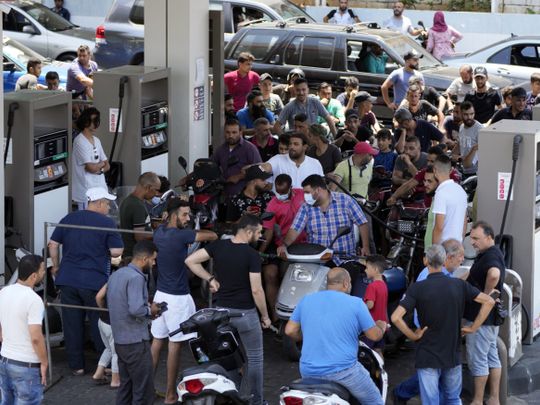
Beirut: Lebanon’s central bank lifted fuel subsidies effective Thursday, adding another level of hardship to a country already reeling from a devastating economic crisis.
President Michel Aoun summoned central bank governor Riad Salameh after the move, which is meant to alleviate an energy shortage but is also expected to drive up prices, increasng despair in a country where poverty has already become rampant.
The central bank will use market prices for fuel when extending letters of credit to importers, according to a central bank statement released late Wednesday. Gas station owners and fuel importers had accused the central bank, whose foreign reserves have been depleted, of being slow to open credit lines, creating a fuel shortage that’s plunged the once-middle class nation into darkness all but several hours a day.
Lebanon has been suffering since late 2019 from its worst financial meltdown in decades, a byproduct of decades of corruption and mismanagement. The currency has collapsed, driving inflation into triple digits and wiping out life savings. The government is bankrupt, has defaulted on its international debt and has failed to take the measures required to clinch international support.
Lebanon’s president in July asked billionaire Najib Mikati to form a new government, after two other candidates failed in less than a year. The premier said he has the international backing and business experience to stop the country’s descent toward an economic and social implosion that would reverberate across the Middle East.
Salameh had said at a meeting of the Supreme Defence Council that the bank could no longer continue to offer lines of credit and subsidize fuel imports, a ministerial source and Al Jadeed TV said.
Since the onset of the crisis, the central bank had been effectively subsidizing fuel by using its dollar reserves to finance fuel imports at official exchange rates well below the rates on the parallel market.
Most recently, the central bank had been extending credit for fuel imports at a rate of 3,900 pounds to the dollar, compared with a parallel market rate of more than 20,000 pounds on Wednesday.
The central bank’s reserves have sunk from more than $40 billion in 2016 to $15 billion in March. The fuel subsidy costs some $3 billion a year.
Senior finance advisor Mike Azar noted that since the bank would continue to sell dollars to importers, they wouldn’t need to resort to the market causing an even more rapid devaluation of the pound.
The official rate for the Lebanese pound, against which most salaries are benchmarked, is still 1,500 pounds to the dollar, a peg that was maintained for more than two decades until the crisis erupted in late 2019.
Ghobril said the government must now roll out an electronic cash card as quickly as possibly to help needy families.
Parliament approved the prepaid cash cards at the end of June.
In recent days, gas stations have witnessed long queues and deadly altercations, and most people have experienced extended blackouts as diesel becomes scarce.
The hard currency crunch means that medicines are also hard to find and prices for basic goods have skyrocketed, adding to the burden for a population where more than half are below the poverty line.
In a June report, the World Bank said Lebanon’s 12-month inflation rate has risen to 157.9% in March this year from 10% in January 2020.








